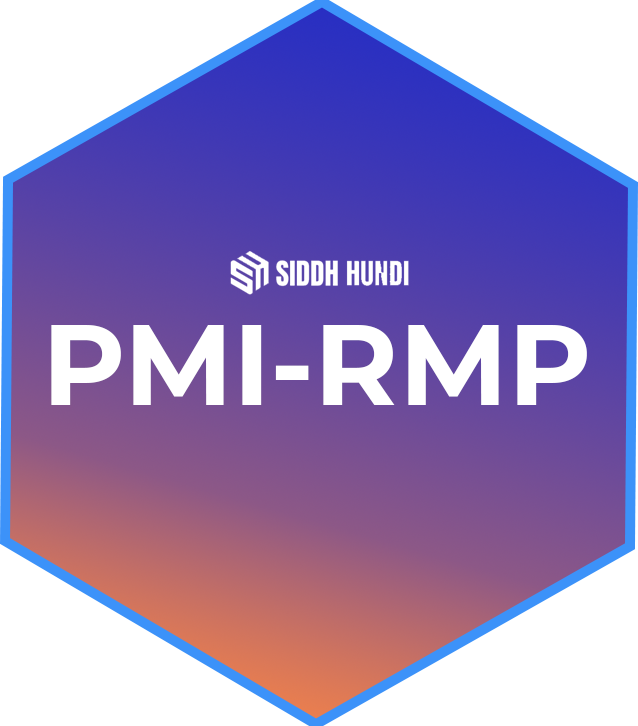PMI - Risk Management Professional
 The Project Management Institute (PMI) offers the PMI Risk Management Professional (PMI-RMP) certification program, which confirms your skill in project risk identification, assessment, and mitigation. Earning this certification demonstrates your advanced understanding of project risk management methods and techniques.
The Project Management Institute (PMI) offers the PMI Risk Management Professional (PMI-RMP) certification program, which confirms your skill in project risk identification, assessment, and mitigation. Earning this certification demonstrates your advanced understanding of project risk management methods and techniques.
PMI Risk Management Professional online training teaches you how to proactively address potential issues, ensure project success, and maximize results while reducing threats and capitalizing on opportunities.
Advantages PMI Risk Management Professional Online Training
The PMI Risk Management Professional online training has both career and industrial benefits. PMI-RMP online training assists project managers in identifying and minimizing risks before they escalate into issues. Consequently, productivity increases, costs are saved, and clients are more satisfied. Engaging in PMI-RMP online training demonstrates skill and professionalism, setting businesses apart and drawing in skilled individuals, ultimately leading to winning significant contracts.
Our Resourceful Approach
Building a Strong Foundation: Understand the basics of risk management and the PMI framework.
Assessing Risks: Learn how to prioritize risks by looking at how likely they are to happen and how much of an impact they might have.
Analyzing Risks Quantitatively: Find out ways to use statistics to figure out how much of an impact risks could have.
Looking at Risks Qualitatively: Learn about ways to judge how serious and urgent risks are.
Planning for Risks: Make a plan for dealing with each risk you've identified, whether that means trying to prevent it, transferring it to someone else, or just accepting it.
Keeping an Eye on Risks: Set up a system to keep track of risks and deal with them as your project goes on.
Reporting Risks: Find simple ways to tell everyone involved in the project about the risks you're facing.
Learning from Examples: Study real-life situations to see how theoretical ideas about risk management work in practice.
Exam - PMI-RMP
The PMI-RMP exam is a computer-based test administered by the Project Management Institute (PMI) to examine an individual's knowledge and skills in project risk management. Passing this test demonstrates your ability to identify, analyze, respond to, and mitigate risks within projects using PMI's established framework.
Target Audience
- Project Managers
- Assistant Project Managers
- Project Engineers, Schedulers, and Estimators
- Anyone with relevant experience
Exam Format
Delivery Method: Computer-based test
Number of Questions: 180 multiple-choice questions
Time Allowed: 4 hours
Content: 5 Key Domains
Prerequisites
PMI Risk Management Professional online training has no formal requirements. This means that anyone, regardless of educational background or experience level, can participate in a course on project risk management best practices. The program will provide you with the knowledge and abilities required to succeed in the field.
Exam Topics
Risk Management Processes: This domain delves into the core processes involved in effective risk management throughout the project lifecycle. It covers aspects like risk identification, assessment, planning, response, monitoring, and control.
Planning and Conducting Risk Management Activities: This section focuses on how to plan and execute risk management activities within a project. You'll learn about risk management planning documents, stakeholder involvement, risk analysis techniques, and risk response strategies.
Risk Monitoring and Controlling: Effective risk management is an ongoing process. This domain emphasizes techniques for monitoring identified risks, tracking their impact, and implementing control measures to mitigate or prevent their occurrence.
Risk Communication and Reporting: Clear communication about project risks is crucial. This section explores strategies for communicating risks to stakeholders at different levels, ensuring everyone is informed and aligned with risk management plans.
Professional Responsibility and Ethical Conduct: Project risk management professionals have a responsibility to uphold ethical standards. This domain covers ethical considerations in risk management practices, ensuring transparency and responsible decision-making.
Recertification
PMI requires PMI-RMP certification holders to maintain their certification through continuous professional development (PDU) programs. You need 30 PDUs in 3 years for recertification. These PDUs can be earned through a variety of activities, including attending PMI-approved courses, volunteering in project management jobs, and even publishing articles about the subject. Siddh Hundi is an excellent resource for locating relevant PDU-earning opportunities to help you keep your PMI-RMP certification.
Why Choose Us?
- Sharpened Risk Identification Skills
- Confident Risk Assessment
- Craft Strategic Risk Responses
- Become a Risk Monitoring Expert
- Effective Risk Communication
- Mock Exams and Self-Assessment Tools
- Dedicated Support Team
- Increase Your Market Value
Career Paths Open Up
Earning your PMI Risk Management Professional online training opens the door to a plethora of intriguing employment choices. The information and abilities gained through PMI-RMP online courses qualify you for positions in a variety of industries. You could work as a risk management specialist, project risk analyst, risk program manager, or even Chief Risk Officer.
The demand for qualified risk management professionals is high, and PMI Risk Management Professional online training may lead to greater wages and faster career advancement.
Launch Your Project Management Career Today
Launch a rewarding career in project risk management! Equip yourself with in-demand abilities for navigating uncertainty and ensuring project success. Join Siddh Hundi's PMI Risk Management Professional online training today.
